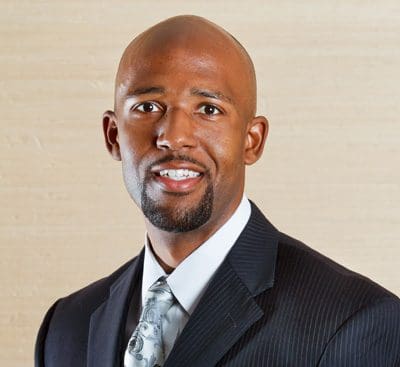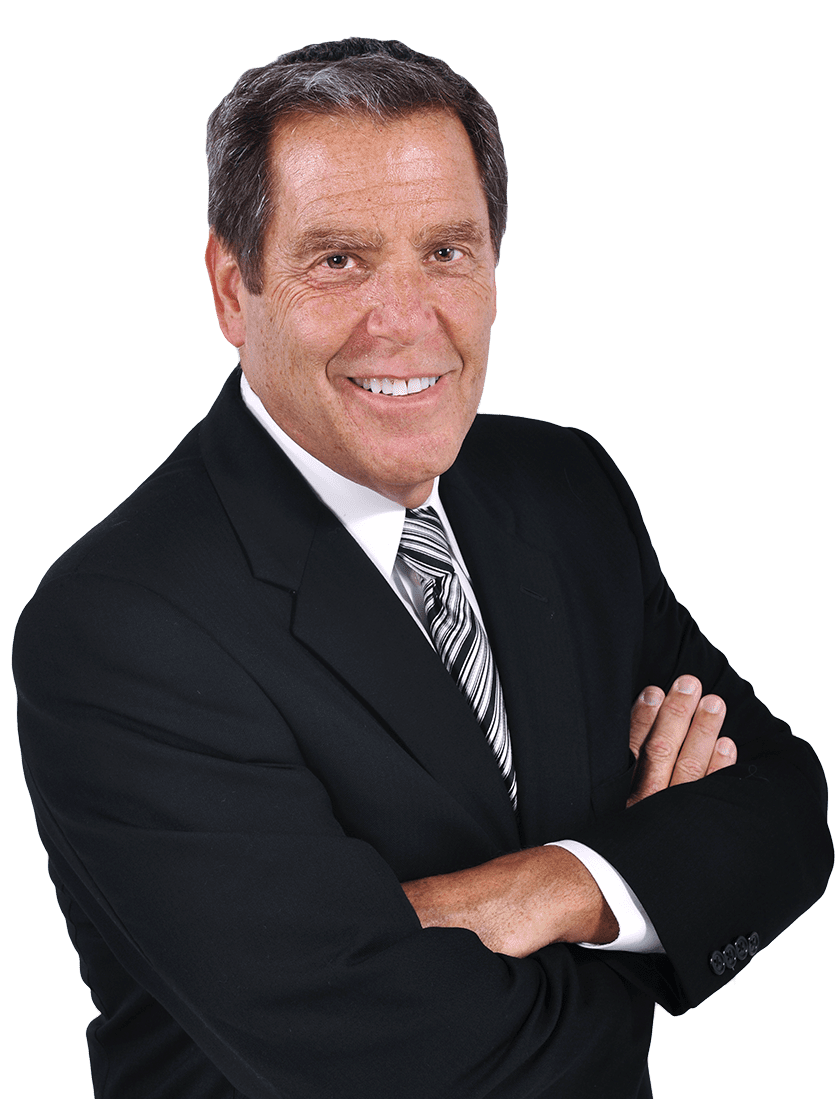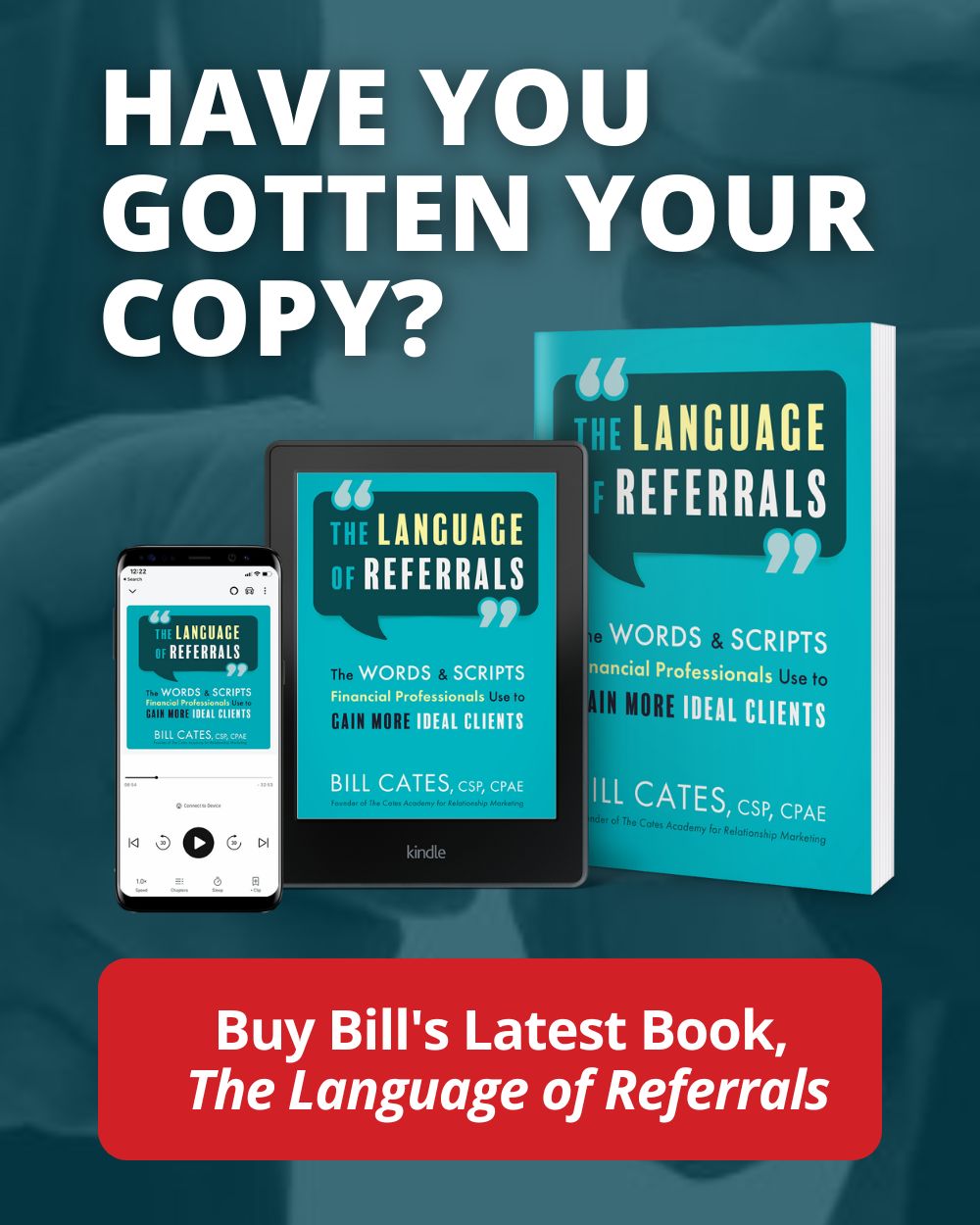Check Out Bill Cates’ NEW Top Advisor Podcast™
Interviews with Top Advisors for Top Advisors!
Top Advisor Podcast™
Ep. #3- How a Business Friendship Can Turn a Loyal Client into an Advocate with Lester Matlock, CFP®, CRPC®, APMA®
Many financial advisors like to keep an arm’s length distance between themselves and their clients, keeping everything strictly on the professional level.
But many of the most successful financial advisors are doing the opposite.
In this episode, Referral Coach Bill Cates is joined by Lester Matlock CFP®, CRPC®, APMA®, private wealth advisor. Lester discusses his Bucket List Campaign and how he creates a business friendship with clients, so they become his biggest advocates.
Want More Top Advisor Podcast Episodes? CLICK HERE!
–
Lester discusses:
- Why Lester sold part of his practice to focus on a more targeted market.
- How he got started helping his clients accomplish some of their Bucket List goals.
- What the Bucket List Campaign is and how it works.
- An example of how his business friendship with one of his clients made a huge difference for her and her family.
Connect With Bill Cates:
-
Show Transcript
BILL CATES: Welcome to the top advisor podcast brought to you by ProudMouth’s Influence Accelerator Academy. I’m your host Bill Cates. In each episode, I interview one of the financial service industries top performers to learn their secrets to sustain success. These short interviews will get right to the heart of what each top advisor is doing to acquire more right fit clients.
You’ll be reminded, renewed, and inspired to take powerful action. You’ll impact more lives and increase your income at the same time. Now onto the show.
Over the last 26 years or so I’ve interviewed quite a few successful financial advisors and some advisors like to keep kind of an arms length with their clients, keeping everything strictly on the professional to professional level.
Other advisors enjoy the process, whether it’s planned or organic of turning many of their clients into not just business friends, but even personal friends. So I found that the secret sauce for turning satisfied and loyal clients into advocates, into those who will talk about us is what I like to call the business friendship.
Engaged clients will refer and introduce you. And your business friendship clients become advocates for you. I suspect many advisors listening right now have created a number of business friendships and know exactly what I’m talking about. So along these lines, my guest today has initiated a program that he calls the bucket list campaign.
Now, this is not to be confused with the Bucket Plan book by Jason L. Smith, which is a pretty good book by the way, or the Bucket Financial Planning Process. So before I give everything away and render this interview useless hailing from Little Rock, Arkansas, Lester Matlock, CFC, CRPC, APMA. Welcome Lester to Top Advisor Podcast.
LESTER: Thank you Bill. Glad to be here.
BILL: Well, great to have you. I enjoyed our little preparatory interview, and I just knew this was going to have some good value for our top advisors listening. So before we get into this main topic, this business friendship and bucket list campaign that you’re doing, when we spoke a while back, you told me that your practice was going through a big transition.
Can you tell our listeners a little bit about that transition? Transitioning from what, to what? And how it’s taking shape.
LESTER: Absolutely. I think when we spoke, I was sharing that after two and a half decades in this career I was receiving clients from all over the board. We were getting a lot of referrals but I hadn’t really focused on a niche market, which meant I was going wherever people were to get clients.
And I woke up one morning and I found that I was serving on 11 boards. I was going a hundred miles an hour. I had lots of clients that were out of segment. And after two and a half decades, I thought this is not the way it should be. So at that point, I made some changes and began to do some things differently in my practice.
BILL: I believe that one of the things you did was sell part of your practice to move other clients to someone else who was more excited to serve them. Tell us about that a little bit.
LESTER: Yeah. That was part of a long process of things. And I’ll be brief in sharing that with you.
I’d hit a stage where I felt overworked and underappreciated in general, and I’m sure many other advisors have probably felt that way. And so I knew I had to make some changes. I looked at about a third of my book of business. That was kind of that lower third. I found a young advisor up and coming who was happy and had more time than I to serve those clients.
So, I sold him that book of business and began working with primarily those top tier clients that I wanted to duplicate.
BILL: And you started to focus on a bit of a niche, you became more targeted, not just wherever people were.
LESTER: Absolutely. What I recognize was when I had more time. I had more time to think. And so I sat down with my client list and I said, who are the folks I really enjoy working with? Where are they at? Where are they coming from? And the Eureka kind of hit, wow, I’m getting a lot of clients from this particular segment of the market. Particularly from this organization, I enjoy working with them.
Several of them are advocates. They refer. And the light came on and I said, I just need to focus on going after this particular market.
BILL: So what market was that? Exactly.
LESTER: So that was the medical university here in town. Many of my clients are professors, deans that work in the administrative areas of the medical university.
And I recognized that I really enjoyed working with them. Before I knew it. I was serving on boards over there and just becoming really active and speaking to graduating students.
BILL: Hmm, that’s great. It’s always a minute. We’ve talked about this in other episodes of Top Advisor Podcast, about nesting in a company, nesting in a university. Any kind of target market does seem to make things easier.
What type of relationships do you like to have with your ideal clients? Are you trying to go for this “business friendship”? Something more? And how do your clients react? What do they want from you? Give us a sense of an ideal relationship with an ideal client.
LESTER: I don’t know Bill if you coined the phrase business friendship, but I had not heard of that in the context until you and I were talking. And that’s probably how I would describe my relationship with most of my clients.
And for me at this stage, that’s most enjoyable. The transactional side of things doesn’t satisfy me as much as getting to know the clients relating to them. I know their children. We’ve traveled together. We go to dinner together and they’ve just become part of my life and my family’s life.
BILL: And we talked about this concept, not a new concept, but multiple touches with your clients on different levels. What are some of the things that you do with clients to accentuate that business friendship?
LESTER: We send out birthday cards every year that I write. I do personal birthday cards.
I don’t find the bulk cards where everyone gets the same card, particularly when you have so many folks working in the same environment. I go to the hallmark store and I pick out cards and unique ones and I write personal notes. I put in there a $5 or $10 Starbucks gift card and, “Hey, have a cup of latte on me”.
We send flowers for special events. Sometimes we send flowers just to say, Thanks for being a client. Every Monday morning, my team gives me a list of folks that I just make random calls to through the week. “Hey, just thinking about you Bill you cross my mind. How are you? I just wanted to say have a great day. We’ll talk soon.”
BILL: I love it. And it’s a system, it’s not a complicated system, but your staff is charged with the task of bringing you a list of how folks each week. How many folks each week do you have to make these little check-in calls?
LESTER: You know, it’s generally eight to 12. It’s not a lot. And it’s actually fun to do.
BILL: Is it usually a voicemail that you leave or they call you back? Do you do this when you’re driving somewhere, give me a sense.
LESTER: So it’s about half and half, you know, I’m calling the cell phone in most instances, if they pick up, then it’s a brief conversation.
Otherwise, you know, I’ll leave a message and I’ll tell them, “Hey, no need to call me back I know you’re busy. Just wanted to let you know, you’re cross my mind. And I was thinking about you. Have a great day.”
BILL: And I know you’ve done some kind of high-end things too, that we’ll talk about in a minute. So I do want to go deeper with your client bucket list campaign. I know there are a lot of fun, interesting things that you do that we can talk about. But first let’s pause for a quick word from our show sponsor.
[SPONSOR MESSAGE] This podcast is sponsored by ProudMouth Influence Accelerators. If you’re like our clients, you want to spend more time educating people and less time selling. That’s why we turn main street experts like you into trusted mainstream authorities. We help you amplify your influence over a growing audience of magnetically attracted fans who will chase you down.
Visit ProudMouth.com to learn more.
BILL: You’re listening to the Top Advisor Podcast, where I interviewed top advisors for top advisors. My guest today is Lester Matlock from Little Rock, Arkansas. Lester. It’s time. Let’s go deep into this bucket list campaign idea. What is it? How’d you come up with it and how has it played out?
LESTER: It started with this phrase and term. I think a mutual friend of ours has probably used this more than anyone I know. And he calls it, intentional congruence. And that’s getting up every day and saying, How do get what I want to accomplish, but also attack other tasks at the same time. And for me I had my own personal bucket list and things that I wanted to accomplish.
You know, you and I were talking about my wife and I have wanted to visit all 50 states and we’re down to the last state. And I thought, you know, this brings me excitement. And as I began to share that with clients, they would get excited. Every client comes in and wants to know how many more states do you have.
And it was just in thinking about that I said, I wonder since this is so fruitful for me, what would it be like if I began to ask clients what are the one, two or three things that are on your bucket list? What would you absolutely want to do and accomplish? And then what if we set out as a practice to help?
BILL: I just think that’s great. And that is the business friendship. And the person that you’re talking about, I’m going to mention his name is Travis Cheney. And both of us know Travis. In fact, that’s how I met you, through a referral from Travis. And I remember he said something to me once, to the effect of, there’s nothing worse than an unfunded dream, right?
Someone has a dream, bucket list, whatever you want to call it, a goal. But they don’t fund it. They don’t put in the money. And it sounds like, while you’re not necessarily paying for these things or at least all of these things, you’re organizing and helping to organize and make them happen where, you know, left to our own devices we don’t always do these things.
So, tell us about this, bartender for a night thing that you did. I just found it funny and I think this was early on in your figuring this stuff out, right?
LESTER: So, my wife and I were talking at dinner one time.
I was sharing with her Bill, I said, you know, I would love to bartend. I didn’t bartend in college. I think it’s a cool job. And she said, well, why don’t you do it? And I said, well, how do you do that? And if I started bartending, what would my clients think?
They might think we’ve got the wrong guy here. He’s got a bartender job at night. So we were talking and I think through the course of dinner, she said, well, why don’t you just do an event and bartend for them? And I thought that’s genius. So I give this credit to my wife and you know, afterwards I reached out to a local restaurant /bar and they allowed me to come in a couple of weekends before the event.
So we planned this was a major event and I practiced and I found out bartending is very hard. I don’t want to quit my day job, but we’ve put on this event it was well received. We had lots of folks. Your only entry in was, we had a huge chalkboard that said “What’s on Your Bucket List”. And your entry into our event was you had to write on the board a bucket list item. And it turned out it was a wonderful event. We’ve got video from that. And folks had a grand time. I made terrible drinks by the way, but no one told me you know.
BILL: If they walked into a bar and saw you attending one of your practice nights, they’re thinking, here’s this guy who isn’t as successful as it looks. Or maybe he really is charging us a lower fee, so he has to do this. So we saved money on our fees with them.
What was the hardest drink or the funniest drink? Or do you remember any one drink that you had to make that you totally screwed up? I’m just curious if any of that stands out?
LESTER: A Lemon Drop. You would think that it would be an easy drink to make. It’s a martini drink. You have to have the right number of ounces of liquor to simple syrup and so forth. And I was always grabbing the wrong measuring.
And so the first few, you know, it’s probably little more alcohol than it needed to be. But, I started to get the hang of it.
BILL: People come in and they write their bucket list item on a chalkboard. That’s pretty neat, probably some pretty interesting items, some expected, some unexpected. Any stand out as different unexpected?
LESTER: You know, I said at the end of my career, I was going to write a book about some of these. I would not do that at this point, but you know, I was meeting with a client some years back and she was estranged from her siblings. And I think at the end of the loss of the parents, they all dispersed and it didn’t end well.
And it wasn’t a good scene and that bothered her and it seemed to come up a lot. And so as we began talking, I said, you know, if you left this earth tomorrow, would you have any regrets? And she said, “Yeah, not being closer to my siblings”. And we spent some time talking about that and I said, well, what if you just put it out there and say, “Hey, I miss you guys. I’d love to spend some time with you.” And what if you actually paid for you and all of your siblings to go on a cruise? And she said, well, can I afford the first question? Can I afford that? And I said, absolutely you can. And we were not having to pull the money out of your portfolio today, we can plan this out. We can let dividends pay to cash.
And, so we did the financials behind that. She was nervous about reaching out to them because, you know, one brother she hadn’t talked to in over two years. It’s hard when you’re in that kind of arena where you’ve not spoken to siblings. But what does make it a little bit easier is when you say, I’d like to take you on an all expense paid trip. They tend to pick up the phone.
BILL: Yeah, definitely. They’ll perk up for sure.
LESTER: And they did. And, and I think what pleases her and what pleases me the most, is part of the reason I continue to do this was they didn’t take spouses. She just took the siblings and it was just the family.
It was just the brothers and sisters. They had a great time. And after that trip they began to mend and heal they’re relationship, I assume back to normal. They speak on a regular basis. Now they’ve gone on to take other vacations and family reunions together. And, so that was pretty powerful for me.
BILL: Talk about touching lives beyond your normal work. And tell us about a few other things I know there were. I think you did a trip recently. I guess it was before COVID, but my notes say something about 18 people going through a few countries. Tell us about that.
LESTER: So again, one of the things on my bucket list, you’re going to hear this intentional congruence. One of the things on my bucket list was to do one of these Viking trips, these riverboat cruises, up the Danube. And you hit multiple countries. And so I said to my wife, how would you feel if I opened this up and just turned it into a client event. And her first question was, are we paying for everyone?
And I said, no, we aren’t. But what we can do is be the conduit and put everything in place. And we did that. My team worked to establish that. It took us about a year to do the initial planning, but it was something that I wanted to do. I just simply invited clients to be a part of it.
We ended up taking 18 folks. We spent lots of time together when they got on the boat. That first night we had a nice welcome reception. I made sure that there was a bottle of wine and chocolate covered strawberries in their rooms. Every night, there was a gift placed on their bed after they come back from the day’s excursion. And it was wonderful.
We had three prospects come to the event. I think it was within about two months after that event a prospect said, you know I just I think I want to move all of my accounts to you. It’s only $3 million, but would you take a $3 million account? And I said, absolutely. And has not looked back nor have I.
BILL: Wow! So many questions, so many neat things. We’re getting a picture of what you’re doing. Can you give us one more example? I’m just fascinated by this, by the way. In most cases you’re not paying for these things. You’re just helping them facilitate, organize, envision, save for correct?
LESTER: Correct.
BILL: So give us one neat thing that you helped somebody do. If you have another one in your bag.
LESTER: Lots of them! One of my clients was an avid golfer. He says, “I love everything about the golf course. I love the smell of it. I love the dew in the morning.” He had plenty of money to retire.
He said, “I could just go to the golf course and work. I could be the guy driving the golf cart that picks up the balls.” And I thought, you know, this is a guy who’s a member of the country club. But he wants to just be in this environment.
So we talked for a while and I joked with him one day. I said then when you retire, why don’t you just go work at the golf course, work at the country club. And he said, I’d never thought about that. I don’t know what people would think? And I said, who cares what people think? You know, if it’s what you want to do, go do it.
So for the last seven years, if you go play golf at this golf course, he is the happiest person there. A lot of folks think, gosh, he’s working because he needs the money. What they don’t know is this guy doesn’t have to work. But he gets up every morning. You cannot get him away from it. We held a golf tournament two Mondays ago and he was the first one out there getting all the carts ready for us and telling us what the holes are going to be like and what the greens were like during that week. Just a neat story. Wonderful story!
BILL: Folks listening, next time you’re out on the golf course, and there’s a ranger, you know, getting you started on the first tee or whatever it may be, don’t assume this guy is working cause he/she has to. Maybe they just love being around the golf course.
Give them something to do cause what else? So I think that’s great. Sounds like a lot of fun. Sounds like a fair amount of work. And it sounds like you have an incredible wife. Number one, she helps you with creative ideas for your business. Number two, she lets you turn this vacation into a client event.
I don’t imagine my wife would ever want to do that. What’s the payoff. Besides you’re having a good time and getting to know your clients, and obviously you can see a pay off for them. I mean, they’re realizing some big dreams, little dreams. Client engagement for sure. Client loyalty.
I would suspect absolutely referral introductions. Does it actually generate more assets or more clients?
LESTER: It does. You know, we have what we call organic marketing and that’s marketing within the practice. And, most advisors would tell you there’s excitement from bringing on a new client.
But boy, the pain you feel when you lose a client far exceeds the joy of bringing on a new client. And so what we do with these events is it solidifies our existing relationship with clients. You know, my staff will say, Lester likes to seal the window tight. And when you hear them say that, what I’ve taught them is we don’t want to leave room for another financial advisor or competitor to come in and say, I can do what Lester does or just let me work with a portion of your portfolio. So in many instances, we we’re trying to work with all of our clients, all of their assets and be the number one stop for them.
And that I think lends itself to the deepening of the relationship, but we also get lots of referrals from it. We have now become known in our environment for our territory, those folks have the wonderful dinners and do the bus ride to the horse races every year and so on and so forth.
And I liked the fact that that’s how we’re being recognized. Not as the folks that will sell you a mutual fund or some transactional sort of relationship.
BILL: So it seems to me you’re talking about intentional congruence. I see it in this case, like confluence of you have a target market, a niche market.
If you’re Canadian, you have a niche market. And because of that, you get to know their world better. You can serve them better in a lot of different ways. The strengths, weaknesses of their benefits packets, et cetera. You can become a better advisor for these folks. And just through that, I think it’s a little bit easier to create a reputation for yourself.
But because you’re taking it to the next level of really good business friendships, it seems to me that it has become even easier for you to create a reputation.The fact that you do have a reputation now and your target market, is that a fair summary?
LESTER: That’s a fair statement. It is. And some of that’s just the boards I’ve served on.
You know, I think I’d started earlier saying I was at one point I was on 11 boards and I whittled that down to the ones I was most passionate about. And the medical university is one. So I still serve on the boards over there and we give our time and our money and our resources and our talents to the medical university.
BILL: Great. So I have one more question for you, but first, what’s the challenge you’re having in your business. What’s the general area of client acquisition that maybe I can be of some service to you?
LESTER: As you now know, many of the listeners, we do a lot of in-person live events.
They allow us to let our personality come through. It allows our clients to mingle, et cetera. On average, prior to COVID, we were averaging eight to ten events a year and picking up six or eight clients from those events that were insegment. Then COVID came in and just turned that on its heels.
And we have done the virtual events. They’re quite frankly, just not as good. They’re not in person. It’s hard to be personable. One of the things we enjoy about our events is the clients are advocates will talk to the prospects for us and we don’t have to do that. And that’s just very hard to do in this virtual world that we’re in now.
So that’s been a big challenge for me. We’ve seen it, you know, the new client acquisition slow down some and I would highly attribute that to not being able to do those events, those in-person live events, or being able to go on campus and walk around and meet folks. They’re not allowing the folks to just come on the medical campus now or in the hospital if you’re not a patient and you don’t have a reason to be there.
So that’s been a big challenge. I’d be curious to know for other advisors who primarily through in-person events bring on clients. What are they doing and how are they finding success?
BILL: Yeah. So it’s been a challenge, no question. I’ll give you a couple of examples, a couple of thoughts around this.
First of all, whether it’s in-person events or virtual or any kind of event you might do. One thing I always advise advisors when you’re inviting people, especially if it’s not like one specific couple with a few other couples, if it’s a more of a group thing, is if there are people there that you want there, make sure you call them, don’t just email or mail invitations to people.
Because if that personal touch of calling them and saying, Hey, we have this event. It could be an educational event too. Right? If my advisor called me and said “Hey Bill, you know, you got this mutual fund guy coming in he’s talking about this. I think you’d find it very interesting.
If he called me you know, I look to attend. If I just get a letter, a flyer or an email from his firm, I probably wouldn’t give it a second thought. I like to do what I’ll call a call, mail, call sequence. Where we call folks and let them know that we have this event coming up.
And then that they’re going to get an invitation, whether it’s in the mail or email and that you’re going to follow up to see, if they can make it. And see if they’ve identified who they’d like to bring. So pay good attention to the invitation process.
I have identified three basic type events.
The first is the client appreciation event where the whole purpose of the event is to say, thank you to appreciate their business. A lot of advisors will say, feel free to bring a friend or family member. Hoping that they bring someone interested and qualified, but that doesn’t usually happen.
So then the advisor’s disappointed. So if you really want them to bring someone who’s interested and hopefully qualified. Think of it as a personal invitation event, that’s a different type of event.
If the invitation would go, something like this, “Lester, you know, we like to put on events and you know we had the wine tasting. We go to the racetrack every year just grand old time with really as many people as can make it. We’re doing another event coming up. I want you to know about. You know, a lot of our clients do like to introduce us to others. And so we found that in a social setting, it really is one of the best ways to do it because we’re not going to talk business. We just get to know them on a personal level, have a little fun together. And then if the interest is continued, we’ll sit down and we’ll talk business. We have a wine tasting coming up in a month. I just wanted to let you know about it and wanted to see if you’d be open to thinking of inviting a person or a couple to the event for the purpose of introducing us in the low key way, we’re going to send an invite to you. I’ll remind you and then we’ll follow up afterwards to see if you can make it? Who you’ve identified and we’ll go from there.”
So that type of language that I just gave there is very intentional, right? That person knows this event is for introductions? The other events, we have fun. Bring someone, doesn’t matter. But this event, introductions is purpose of this event.
And so therefore some of the events that I’ve seen folks doing virtually, and even after the pandemic’s over, this idea of virtual events won’t go away. Virtual education events will definitely stay and I don’t see why virtual fun events couldn’t stay as well. Maybe not as much. But one team I’ve been coaching up in Canada every month are doing a wine tasting with a client couple who invites another client couple.
They’ve found a wine shop in the area that will deliver a bottle of wine. And then the owner of the shop or the expert in the shop will get on the zoom call. And we’ll talk about the wine, the pairings, the food and they all have a little bit of wine and have some fun.
And he’s used those as personal invitation events. Those are or especially invitation events. Now they’re not just to have a good time. They are for the purpose of introductions.
And another woman who also happened to be Canadian comes to mind here.
When COVID first hit she has a friend who was a musician, a piano player. Very good, sings. Just brought some clients together online for a little mini concert performance. People loved it. They started putting it on Facebook. She saw the buzz that it got and she says, you know, maybe I got something here.
She made it a special event. She had a charcuterie tray delivered to their homes before this event. Either one of her staff or a family member would deliver this tray of food. And their cameras weren’t on so they could be however they wanted to be while they enjoyed the music.
And what started happening is she put on five of these over the course of several weeks. And without even saying, invite someone, people started saying, “Hey, can I invite this person?” And, I personally probably would have been a little more purposeful. But in spite of the fact that she wasn’t purposeful, she got a lot of referrals and business.
She got a lot of new clients from this just from doing what you do, right? Developing the relationship, caring, trying to figure out how do we make the best of the situation where we can’t go out. So that’s just a few ideas. And then one other thing is generally speaking, you want to keep events on the smaller side. Now with zoom, I guess it doesn’t matter quite as much, but let’s think through it. The whole point of an event is for connection. You want to connect with these people. So whether they’re guests or clients. The larger the event, the thinner the connection. So for in person events, I’m thinking dinner no more than eight to 10 people fit around one round table, right?
Otherwise you’re doing the wedding table hopping thing, and you don’t really get to connect with those folks. If it’s a wine tasting, if it’s a bartender night, it could be a little bit more cause people are walking around schmoozing, but just be careful. Don’t get so eager to invite so many people that they have the shoes event, but you don’t really get to connect with them.
LESTER: Makes sense.
BILL: Yes. So I hope that helps a little bit.
LESTER: It does. Thank you. I’ve got some great ideas from there.
BILL: Yeah. Good, good. My final question, I’ve been asking this of all my guests, some interesting answers. I’d like you to think back, you know, or look back over the last 12 months or so.
What have you learned about your business? What have you learned about yourself? Meaning how has Lester Matlock grown over the last year?
LESTER: If I can give that to you in a short version I’ve because I’ve been on about a three and a half year trek with this, do whatever comes to mind.
So I think Bill, one of the things that has really come front and center for me is that I’m only human. And for years I’ve tried to be all things to everyone. And what ends up happening is you get burnout. You don’t get as much accomplished. And so we’ve heard it in various ways. Keep it simple, small is good. So, the biggest learning for me here in the last year, or so has been the word “No”, in and of itself, is a complete sentence. And the more I say “No”, I’ve found the more doors actually opened up. And it’s weird when you think about it in that way. So that, and then just taking necessary time to rest. When my body tells me, it’s time to rest and don’t go so hard and don’t go so fast, I’m listening to it now.
BILL: Yeah. It’s it sounds like Lester Matlock has decided to take care of himself even more. You like to take care of others and help others do good things in this world. I think it’s a sign of maturity, if you will. Not that you were immature, you know what I’m talking about? I think that’s a great thing.
I could have used you a couple of weeks ago. I found out I volunteered for something I didn’t realize I had volunteered for you. You know it’s one of those things where the line steps back and you’re left in front.
Lester, this is a pleasure. It’s a pleasure getting to know you. It’s a pleasure to see what you’re doing.
It’s creative, it’s clearly meaningful in the lives of other people. And it certainly takes beyond just the financial advisor part. But when you think about it, money touches every part of our lives. I don’t care what part of our life, money in some way, influences, touches, affects, impacts that part.
And that’s what you’re doing. You’re being a more complete advisor. And I love it. Thank you for being on Top Advisor Podcast.
LESTER: Thank you for having me, Bill.
BILL: Thank you for listening to the Top Advisor Podcast brought to you by ProudMouth’s Influence Accelerator Academy. Click the subscribe button below to be notified when new episodes become available. Visit my website, referralcoach.com for links to my books, courses, and online tools and to register for the Cates Academy.
About Our Guest

Lester Matlock’s CFP®, CRPC®, APMA® first passion is being a financial advisor and mentor. Mentoring students has afforded him the ability to pay forward the guidance and counseling he received as a student. Extreme fitness and mixed martial arts are his most common pastimes when he and his wife are not traveling. He’ll confess, collecting cuff-links (especially vintage) has fast become a favorite hobby of his.
Connect With Lester Matlock:
![]()
Never Miss an Episode!
Click below to subscribe on your favorite podcasting platform.
P.S. Don’t keep Top Advisor Podcast a secret … share with a friend or colleague!
Click Here to Subscribe Tell a Friend

About Your Host
Bill Cates, CSP, CPAE, works with established financial advisors to speed up their growth without increasing their marketing budget. Advisors tap into Bill’s proven process to multiply their best clients through introductions from advocates and Centers of Influence (such as CPAs and attorneys), communicate their value proposition more effectively, and create a reputation in a profitable target market. Bill helps advisors move from push prospecting to magnetic marketing – to attract more Right Fit Clients™.
Bill is the author of four best-selling books, Get More Referrals Now, Don’t Keep Me a Secret, Beyond Referrals, and Radical Relevance. Bill is a highly sought-after international speaker and coach, as well as the founder of The Cates Academy for Relationship Marketing™.
Do you know someone Bill should interview (including yourself)?
Do you have a topic you’d like to see covered?
Contact Bill Cates directly: BillCates@ReferralCoach.com








